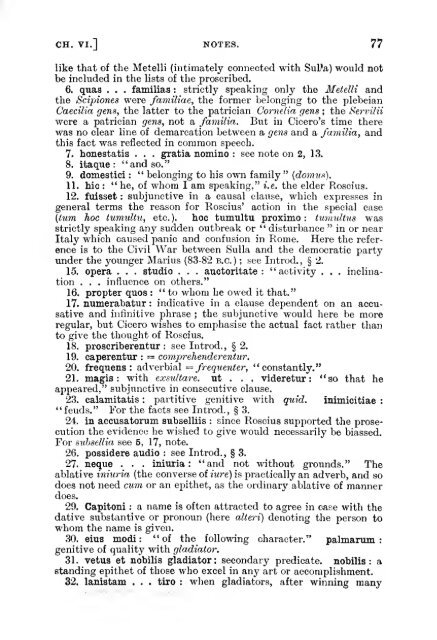Pro S. Roscio Amerino
Pro S. Roscio Amerino
Pro S. Roscio Amerino
You also want an ePaper? Increase the reach of your titles
YUMPU automatically turns print PDFs into web optimized ePapers that Google loves.
CH. VI.] NOTES. 1*i<br />
like that of the Metelli (intimately connected with SuFa) would not<br />
be ineluded in the lists of the proscribed.<br />
6. quas . . . familias : strictly speaking only the Metelli and<br />
tlie Scipiones were familiae, the former belonging to the plebeian<br />
Caecilia gens, the latter to the patrician Comelia gens ; the Sennlii<br />
were a patrician geiis, not a familia. But in Cicero's time there<br />
was no clear line of demarcation between a gens and a familia, and<br />
this fact was reflected in conimon speech.<br />
7. honestatis . . . gratia nomino : see note on 2, 13.<br />
8. itaque : "andso."<br />
9. domestici : " belonging to his own family " (domns).<br />
11. hic : " he, of whom I am speaking," i.e. the elder Roscius.<br />
12. fuisset : subjunctive in a causal clause, wliich expresses in<br />
general terms the reason for Roscius' action in the special case<br />
(lum hoc tumultu, etc. ). hoc tumultu proximo : tumtdtus was<br />
strictly speaking any sudden outbreak or " disturbance " in or near<br />
Italy which caused panic and confusion in Rome. Here the reference<br />
is to the Civil War between Sulla and the democratic party<br />
under the younger Marius (83-82 b.c. ) ; see Introd., § 2.<br />
15. opera . . . studio . . . auctoritate : " activity . . . inclination<br />
. . . influence on others."<br />
16. propter quos : " to whom he owed it that."<br />
17. numerabatur : indicative in a clause dependent on an accusative<br />
and infinitive phrase ; the subjunctive would here be more<br />
regular, but Cicero wishes to emphasise the actual fact rather than<br />
to give the thought of Roscius.<br />
18. proscriberentur : see Introd., §2.<br />
comprehenderentur.<br />
19. caperentur : =<br />
20. frequens : advevhisil = frequenter, " constantly."<br />
21. magis : witli exsultare. ut . . . videretur : "so that he<br />
appeared," subjunctive in consecutive clause.<br />
23. calamitatis : partitive genitive with quid. inimicitiae :<br />
"feuds." For the facts see Introd. , § 3.<br />
24. in accusatorum subselliis : since Roscius supported the prosecution<br />
the evidencc lie wished to give would necessarily be biassed.<br />
For suhsellia see 5, 17, note.<br />
26. possidere audio : see Introd. , § 3.<br />
27. neque . . . iniuria : "and not without grounds." The<br />
ablative iniuria (the converseof mre) is practicallyan adverb, and so<br />
does not need c^im or an epithet, as the ordinary ablative of manner<br />
does.<br />
29. Capitoni : a name is often attracted to agree in ease with the<br />
dative substantive or pronoun (here alteri) denoting the person to<br />
whom the name is given.<br />
30. eius modi " : of the following character." palmarum :<br />
genitive of qualitj' with gladiator.<br />
31. vetus et nobilis gladiator: secondary predicate. nobilis : a<br />
Btanding epithet of those who excel in any art or accomplishment.<br />
32. lanistam . . . tiro : when gladiators, after winning many

















